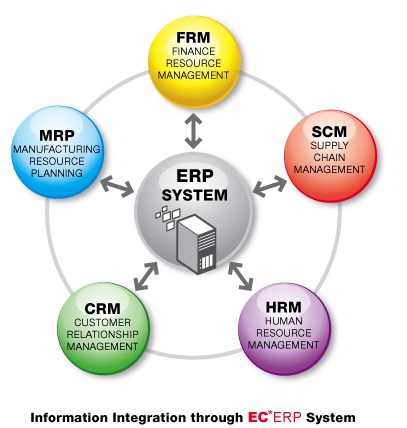ERP - Leveraging IT !
Enterprise Resource Planning or Simply ERP is a software package which is used to support many business functions in an organization like Finance, Sales, Service, Marketing, Human Resources, Supply Chain, Logistics, Planning etc.The list is exhaustive and so is the level of detail in such packages. One ERP package is enough to handle a complete business end to end.
A business using ERP can integrate all its business processes into the package. From manufacturing an item on shop floor to storing it in warehouse. From picking it up from warehouse to transferring it to a distributor. With all this he can keep all the accounts like accounts payable and account receivables. The system will tell the credit limit or the credit worthiness of the supplier or buyer instantly.

At distributor’s level, an ERP package can be used to sell and transfer the product to the retailer and get all the payments accurately. The system will take care of all the complexities of the business.
So what is the advantage of using an ERP ?
1) Everything is automated
2) If its automated, the process would be much faster e.g. it will take you less time to complete a sales order as compared to before
3) Everything is streamlined
4) The processes are centralized
5) High level of integration among various business functions e.g. If a sale is made by a sales rep,all the money matters would be automatically handled by the system and sent to the Finance department.
So which package is suitable for me ?
ERP market is mainly dominated by two players Oracle and SAP. They both provide end to end fully integrated business packages which can take care of your entire business cycle.
1) SCM - Supply chain management e.g. Oracle ASCM
2) MM - Materials Management e.g. SAP MM
3) CRM - Customer Relationship Management (Sales and Marketing) e.g. Siebel CRM
4) Financials - SAP FICO,Oracle Financials
5) Planning - Demantra
6) HRM (or HCM) - Human Resource(or Capital) Management – PeopleSoft

These are just examples of the packages made available by both of them.
A company can buy the entire package or can buy it module by module.
Historically ERP was started mainly to support manufacturing and supply chain. Things like Bill of materials (BOM), inventory management, warehouse management, production schedules were handled by ERP but today ERP is much more advanced and covers a larger span of business functions.
Today there is a separate package to handle marketing, sales better known as CRM. Siebel (from Oracle) is the market leader in that. Similarly Peoplesoft is a leading HR package. It has everything from recruitment to compensation to job design.
So are there any disadvantages of ERP ?
Yes,there are.
Despite these potential benefits, however, traditional ERP systems also had a number of drawbacks. For instance, the early systems tended to be large, complicated, and expensive. Implementation required an enormous time commitment from a company's information technology department or outside professionals. In addition, because ERP systems affected most major departments in a company, they tended to create changes in many business processes. Putting ERP in place thus required new procedures, employee training, and both managerial and technical support. As a result, many companies found the changeover to ERP a slow and painful process. Once the implementation phase was complete, some businesses had trouble quantifying the benefits they gained from ERP.
Like everything ERP has its pros and cons but the pros are much more in number. ERP is a vast field and is playing an important role in shaping up the way business is done.
The article has been authored by the editorial team. The content on MBA Skool has been created for educational & academic purpose only.
If you are interested in writing articles for us, Submit Here
Share this Page on:
What is MBA Skool?About Us
MBA Skool is a Knowledge Resource for Management Students, Aspirants & Professionals.
Business Courses
Quizzes & Skills
Quizzes test your expertise in business and Skill tests evaluate your management traits
All Business Sections
Write for Us